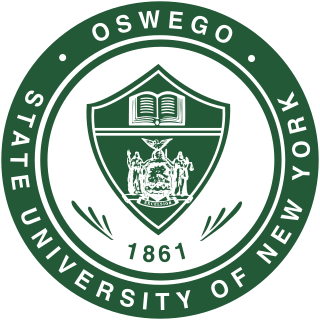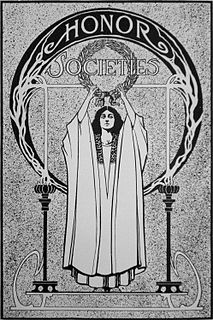
Knowledge transfer refers to sharing or disseminating of knowledge and providing inputs to problem solving. In organizational theory, knowledge transfer is the practical problem of transferring knowledge from one part of the organization to another. Like knowledge management, knowledge transfer seeks to organize, create, capture or distribute knowledge and ensure its availability for future users. It is considered to be more than just a communication problem. If it were merely that, then a memorandum, an e-mail or a meeting would accomplish the knowledge transfer. Knowledge transfer is more complex because:

Fairleigh Dickinson University is a private university with its main campuses in the U.S. state of New Jersey. Founded in 1942, Fairleigh Dickinson University currently offers more than 100 individual degree programs to its students. In addition to its two campuses in New Jersey, the university also has a campus in Canada, a campus in the United Kingdom, and an online platform. Fairleigh Dickinson University is New Jersey's largest private institution of higher education, with over 11,000 students.
Technocapitalism or tech-capitalism refers to changes in capitalism associated with the emergence of new technology sectors, the power of corporations, and new forms of organization.
Information overload is the difficulty in understanding an issue and effectively making decisions when one has too much information (TMI) about that issue, and is generally associated with the excessive quantity of daily information. The term "Information overload" was first used in Bertram Gross' 1964 book, The Managing of Organizations, and was further popularized by Alvin Toffler in his bestselling 1970 book Future Shock. Speier et al. (1999) said that if input exceeds the processing capacity, information overload occurs, which is likely to reduce the quality of the decisions.

State University of New York at Oswego is a public college in the City of Oswego and Town of Oswego, New York. It has two campuses: historic lakeside campus in Oswego and Metro Center in Syracuse, New York.
Knowledge workers are workers whose main capital is knowledge. Examples include programmers, physicians, pharmacists, architects, engineers, scientists, design thinkers, public accountants, lawyers, editors, and academics, whose job is to "think for a living".

In the United States, an honor society is a rank organization that recognizes excellence among peers. Numerous societies recognize various fields and circumstances. The Order of the Arrow, for example, is the National Honor Society of the Boy Scouts of America. Chiefly, the term refers to scholastic honor societies, those that recognize students who excel academically or as leaders among their peers, often within a specific academic discipline.
A knowledge market is a mechanism for distributing knowledge resources. There are two views on knowledge and how knowledge markets can function. One view uses a legal construct of intellectual property to make knowledge a typical scarce resource, so the traditional commodity market mechanism can be applied directly to distribute it. An alternative model is based on treating knowledge as a public good and hence encouraging free sharing of knowledge. This is often referred to as attention economy. Currently there is no consensus among researchers on relative merits of these two approaches.

Michael H. Moskow is currently vice chairman and distinguished fellow on the global economy at the Chicago Council on Global Affairs. From 1994 to 2007, he served as president and chief executive officer of the Federal Reserve Bank of Chicago. In that capacity, he was a member of the Federal Open Market Committee, the Federal Reserve System's most important monetary policy-making body.
Innovation management is a combination of the management of innovation processes, and change management. It refers to product, business process, marketing and organizational innovation. Innovation management is the subject of ISO 56000 series standards being developed by ISO TC 279.
Fred Spira (1924–2007) was an inventor and innovator in photography as well as a collector of photographic equipment, images, books, and ephemera. He is credited as one of three individuals who opened up the U.S. market to quality Japanese photographic goods.
Basex is an IT research and consulting firm that focuses on knowledge management, information management, and collaboration issues and technologies within larger organizations. Founded in 1983, it was known as The Basex Group until 2001.

University School of Management Studies is a graduate ON-CAMPUS business school of Guru Gobind Singh Indraprastha University in New Delhi, India. The school offers a full-time MBA program, doctoral programs, as well as many other management programmes. It is currently the only on campus Business School under Guru Gobind Singh Indraprastha University. The School is rated A+ in Best B-Schools Survey, 2006 conducted by Business India.

Lambda Pi Upsilon (ΛΠΥ), also known as Latinas Poderosas Unidas Sorority Inc. or Lambda Divas is a Latina oriented sorority founded at SUNY Geneseo by six women who believed that the problems of womanhood, particularly those of Latinas, needed to be addressed and resolved on campus by seeking unity, cultural identity, and growth of mind as a whole group.
The Tepper School of Business is the business school of Carnegie Mellon University. It is located in the university's 140-acre (0.57 km2) campus in Pittsburgh, Pennsylvania, US.
Morten T. Hansen is a Norwegian-American professor, management theorist, motivational speaker and author.

The National APIDA Panhellenic Association (NAPA) is an umbrella council for twenty Asian, Pacific Islander, and Desi American fraternities and sororities in universities in the United States.







